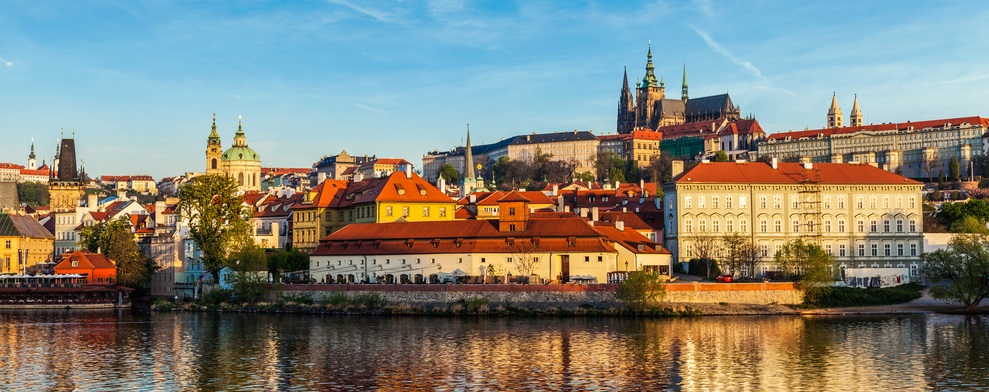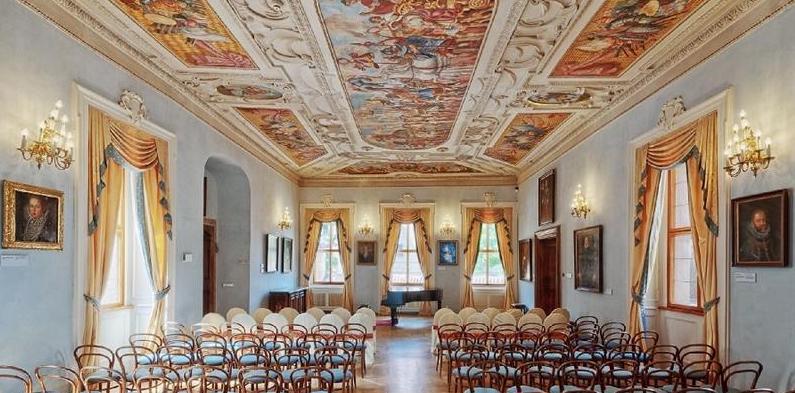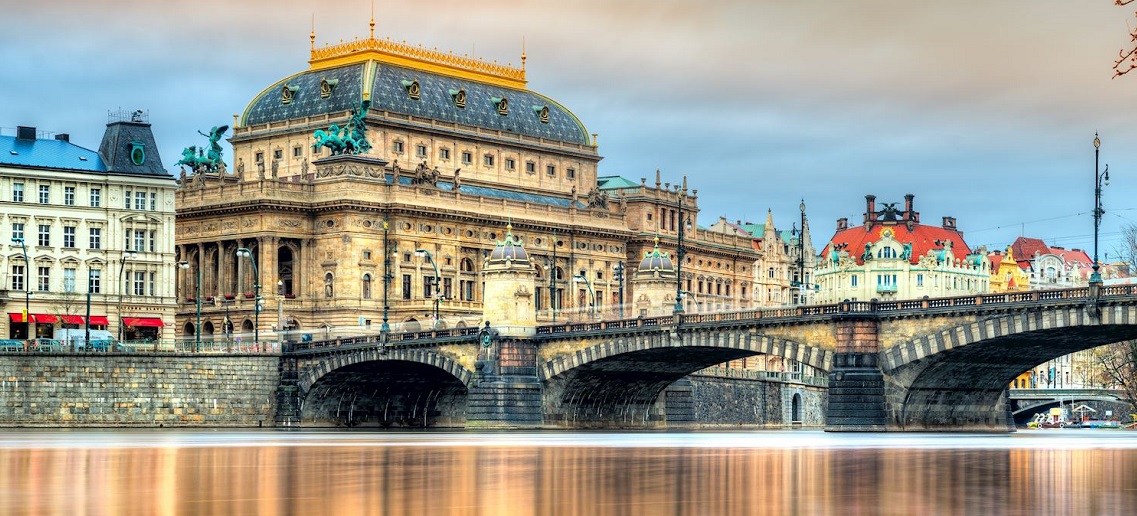Composers and Prague
Czech and world composers linked to Prague
Prague is said to be "the Mekka of classical music". As a matter of fact, many world famous composers called Prague a home or spent here a significant time enough to let the Czechia capital city, its atmosphere and magic, influence their music. Czechia has also been the birthplace of several musical geniuses who became renowned all over the world. Read on and learn about the famous composers connected to Prague:
Antonín Dvořák
Bedřich Smetana
Bohuslav Martinů
Jan Dismas Zelenka
Leoš Janáček
Antonio Vivaldi
Ludwig van Beethoven
Wolfgang Amadeus Mozart
__________________________________________________________________________________________________________________________________________________________
Antonín Dvořák (1841-1904)
Dvořák is the second Bohemian composer to achieve worldwide recognition, famous for turning folk material into 19th-century Romantic music. His joyful and profound works continue bringing happiness to audiences and musicians from all around the world.
Dvořák was born in Nelahozeves near Prague into humble family of 9 children, his father was an innkeeper and butcher and an avid amateur musician. Dvořák was a violin student from age of six and his parents encouraged his musical practise although he also trained as a butchler. He was supposed to take over family´s business, but it was clear his journey was headed different direction...
He moved to Prague where he studied organ and German and lived with his distant family. After graduation, he accepted the post of a viola player in the Komzak Ensemble performing in restaurants and promenades. For 9 hears he performed with the Ensemble at the Provisional Theatre while also writing his own music. Later he worked for three years as an organist at St. Adalbert’s Church and earning money from winning the state scholarships.
Dvořák performed in the United Kingdom, Russia and from 1891 until 1895 he lived in America where he composed his most famous works. Antonín Dvořák died in Prague.
Interesting facts about Antonín Dvořák:
- Dvořák loved trains. His love for trains begun at an early age when he witnessed the construction of the railway track that passed through Nelahozeves.
- He studied organ in the Institute for Church Music in Prague.
- His first compositions went unnoticed.
- Johann Brahms played a major role in Dvořák´s success. Brahms noticed Dvořák during the Austrian State Stipend for composers in which Brahms was a judge. He later became Dvořák´s mentor.
- P. I. Tchaikovsky met with A. Dvořák and invited him to perform in Russia. The concerts were very well received.
- While in America, Dvořák produced his most famous works: String Quartet No. 12 known as 'America', 'Cello Concerto' in B minor, and 'New World Symphony.
- Dvořák married his wife Anna after being turned down by her sister Josefína. They had nine children (of whom three children died early).
- Josef Suk was his son in law.
- Villa Amerika - Dvořák Museum in Prague was opened in 1932.
Dvořák´s most famous works:
Many of Dvořák's compositions, such as the Slavonic Dances and his large collection of songs, were directly inspired by Czech, Moravian, and other Slavic traditional music.
- Symphonies: Symphonies Ns. 1-8, Symphony No. 9 in E Minor ("From the New World") - often performed in the Municipal House - Smetana Hall
- Choral works: Stabat Mater, Requiem, Te Deum, Mass in D major, Saint Ludmila, The Spectre's Bride
- String quartets: String Quartet No. 12 in F, Op. 96 ("The American")
- Operas: Rusalka, The Jacobin, Kate and The Devil - see in the Prague National Theatre
- Songs: Biblical Songs, Gypsy Songs
- Concertos: Concerto for Cello and Orchestra in B minor, Op. 104
- Piano works: Slavonic Dances, Humoresque
Visit Dvořák Hall in Rudolfinum for a classical music concert or State Opera in Prague.

Bedřich Smetana (1824-1884)
Smetana is regarded as "the father of Czech music". His statue is situated at the front of Smetana Museum, intently listening to the sound of the River Vltava, close to Prague Charles Bridge. He was born in Litomyšl, his father, František Smetana, was an accomplished musician and brewer.
His best piece, the series of symphonic poems named Má Vlast (My Country), was based on myths and places symbolic to the Czechs. His most-known work in the English-speaking world is by far The Bartered Bride, which marbles Czech folk music with the more historically Italian tradition of comic opera.
Interesting facts about Bedřich Smetana:
- Bedřich Smetana began to show musical talent at a very young age. His first solo piano performance was at the age 6.
- He dropped out of school because of his "lack of city manners". However after some persuasion he finished College.
- Smetana didn't learn Czech until he was nearly 40.
- Composer Franz Liszt and Czech writer Jan Neruda were among Smetana's friends.
- Smetana was married twice, had 6 daughters, 3 of them died during the infancy.
- Smetana also lived, taught music and wrote orchestral works in Sweden.
- He never heard his later work due to his ill health. He went deaf in 1870s.
- Smetana had a mental collaps in 1884 and few months later died in an asylum.
- Visit Smetana Museum in Prague located by the Vltava (Moldau) river where you'll also see his piano.
Smetana's most famous works:
- Orchestral works: My Country, Oldřich and Božena
- Operas: The Bartered Bride, The Brandenburgers in Bohemia, Dalibor, Libuše, The Kiss - see in the Prague National Theatre
- Chamber Music: String Quartet No. 1 ("From My Life") in E minor, String Quartet No. 2
Listen to a classical music concert in the Smetana Hall of the Municipal House.
%20-%20kopie.jpg)
Bohuslav Martinů (1890-1959)
Martinů was a Czech composer of modern classical music. He wrote an enormous amount of music, including six symphonies, 15 operas, 14 ballet scores and many orchestral, chamber, vocal and instrumental works. He became a violinist in the Czech Philharmonic Orchestra, and briefly studied under Czech composer and violinist Josef Suk.
Martinů was born in Polička, town close to Moravia border where he lived the next few years. Through his life, Martinů lived in Paris, France for 17 years, several years in the USA and his last years were spent in Switzerland. Due to the communist regime in then Czechoslovakia, he couldn't return to his homeland.
Interesting facts about Bohuslav Martinů:
- Martinů was born and spent first years of his life in the tower of the St. Jacob Church in Polička.
- He gave his first violin recital in 1905.
- He was expelled from the Prague Conservatory for "incorrigible negligence".
- He toured Europe with with the orchestra of the National Theatre and later he was a member of the renowned Czech Philharmonic Orchestra under Václav Talich.
- His music was influenced by jazz.
- Martinů was married to French seamstress Charlotte Quennehen.
- Czech composer and conductor Vítězslava Kaprálová was Martinů's pupil.
Martinů's most famoust works:
- Symphonies: Symphony No. 4, H 305, The Symphony No. 6 ("Fantaisies symphoniques"), H. 343, Memorial to Lidice, Czech Rhapsody
- Choral works: The Epic of Gilgamesh, H 351
- Opera: The Greek Passion, Ariane
- Ballet: Istar

Jan Dismas Zelenka (1649-1745)
Zelenka was a late Baroque composer and musician whose unconventional master-pieces have been performed and admired worldwide. Zelenka was born in little village called Lounovice pod Blaníkem as the eldest of 8 siblings. His father was a schoolmaster and organist in Lounovice.
We don't know much about his early years but he did receive his musical training at the Jesuit college Klementinum (Clementinum) in Prague and continued his education in Vienna. Zelenka conducted one of his major works, Sub olea pacis et palma virtutis conspicua orbi regia Bohemiae Corona: Melodrama de Sancto Wenceslao, ZWV 175 at the time of the coronation of Emperor Charles VI.
Interesting facts about Jan Dismas Zelenka:
- He spent most of his professional life in Dresden, Germany, where he came at the age of 30.
- Zelenka never married and had no children.
- His work was admired by such composers as G. P. Telemann and J. S. Bach.
- His work rediscovered Bedřich Smetana.
- 249: that is the total number of Zelenka's known and attributed opus-numbered works
- He is famous for his spiritual and harmonic Baroque compositions.
Zelenka's most famous works:
Most of Zelenka's compositions were sacred works which included three oratorios, 12 masses, and numerous other pieces of sacred music:
Sacred works: Missa Sanctae Caeciliae (St. Cecilia Mass) in G major, ZWV 1, Il Serpente di Bronzo, ZWV 61, Lamentations, ZWV 53
Instrumental works: Six Trio Sonatas, in F major, G minor, B flat major, G minor, F major, and C minor, ZWV 181
Motet-like works: Magnificat in D major, ZWV 108, Laetatus Sum in A, ZWV 90
Other works: Sub olea pacis et palma virtutis conspicua orbi regia Bohemiae Corona: Melodrama de Sancto Wenceslao, ZWV 175
.jpg)
Leoš Janáček (1854-1928)
Janáček is one of the most famous and important Czech composers greatly influenced by Moravian folk music. He has composed many operas, orchestral and choral works and musical compositions for instruments. He was born in small town Hukvaldy, Moravia into the family of 14 children. His father was a a teacher. Janáček received his musical education in Brno and later studied at the College of Organ Studies in Prague to become a music teacher.
Interesting facts about Leoš Janáček:
- Janáček's life is closely connected with Brno, Moravia.
- It was his love of Moravian folk music that had the greatest influence on his work.
- His early music was influenced by the great Czech composer Antonín Dvořák with whom he had a long-term friendship.
- Janáček was married, had two children, son Vladimír who died at the age of 2 and daughter Olga who passed away at the age of 22.
- Janáček directed the Czech Philharmonic Orchestra from 1881-1888.
- He was in love with 38 years younger Kamila Stösslová who inspired him to create lead characters in his three operas (Katya Kabanová, the vixen in The Cunning Little Vixen and Emilia Marty in The Makropulos Affair)
- His visit to Russia and studies of Russian literature influenced his later works (opera Katya Kabanová and the rhapsody Taras Bulba).
- Janáček deeply admired P. I. Tchaikovsky.
Janáček's most famous works:
- Opera: Šárka, Její pastorkyňa (Jenůfa), Věc Makropulos (The Makropulos Case), Z mrtvého domu (From the House of the Dead), Výlet pana Broučka do Mĕsíce (Mr. Brouček’s Excursion to the Moon) and Výlet pana Broučka do XV. stoleti (Mr. Brouček’s Excursion to the 15th Century), Příhody Lišky Bystroušky (The Cunning Little Vixen), Káťa Kabanová (Katya Kabanová)
- Choral works: Glagolitic Mass
- Song cycles: Diary of One Who Vanished, Nursery Rhymes
Operas by Leoš Janáček are often performed in Prague National Theatre.
Antonio Vivaldi (1678-1741)
Vivaldi was an Italian Baroque composer, regarded as one of the greatest Baroque composers whose fame raised again in the 20th century. As a composer, virtuoso violinist, pedagogue, and priest, his life and genius influenced a large number of eminent artists. Born in Venice, Vivaldi had 5 siblings.
His father was a barber and a professional violinist. He taught Vivaldi to play violin. At the age of 15, Vivaldi also started studying to become a priest. Through his life, Vivaldi wrote approx. 800 pieces of works.
Interesting facts about Antonio Vivaldi:
- He was nicknamed il Prete Rosso (The Red Priest) due to his red hair.
- Vivaldi suffered from a form of asthma which limited him in administering mass but gave him more time to spend writing music.
- For approx. 30 years he worked as the master violinist at the Ospedale della Pieta, a home for abandoned children. During this time he produced his most famous music.
- Even during Vivaldi's life, his music was very popular in Prague
- He dedicated "Four Seasons" to Prague based noble Wenceslas from Morzin who supported Vivaldi financially.
- J. S. Bach was a huge admirer of Vivaldi’s music. He transcribed several of Vivaldi’s concerts for keys, strings, organ and harpsichord.
- Emperor Charles VI. was also a huge admirer of Vivaldi's music. He gave Vivaldi the title of knight.
- Vivaldi never married (due to his priesthood), but there might have been a relationship with a young singer named Anna Tessieri.
- Although Vivaldi wrote around 800 different works, his music was rarely played from his death in 1741, when his manuscripts were closed way or even attributed to other composers because he was presumed to be out of favour. Much of Vivaldi's music that was lost or hidden is being gradually rediscovered.
Vivaldi's most famous works:
- Violin concerts: The Four Season, Violin Concerto in A minor, "La tempesta di mare’,
- Orchestral concerts: Gloria
- String concerts: ‘L’estro armonico’ Concertos
- Sacred music: Gloria RV 589, Credo RV 591, Stabat Mater RV 621, moteto O qui coeli terraeque serenitas RV 631
- Opera: Orlando furioso, L’Olimpiade
Hear Vivaldi's Four Season in the Municipal House or Klementinum Mirror Chapel.

Ludwig van Beethoven (1770–1827)
Beethoven's work belongs to the most performed works of classical music at all times. His work combined Classical style and the Romantic era of music. Born in Bonn, Germany, Beethoven had two younger brothers (four other siblings died during infancy). His father pushed Beethoven to practise the piano all day.
After his mother's death, he taught piano to provide for his brothers since his father turned to alcohol. He composed his most important works while deaf.
Interesting facts about Ludwig van Beethoven:
- It is said Beethoven performed in front of W. A. Mozart who took notice of his talent.
- He was briefly taught by Joseph Haydn (but they did not see eye to eye).
- He started losing his hearing at 26, by the age of 46, Beethoven went completely deaf.
- Beethoven never married. He always fell for unattainable women.
- Symphony No. 5 which he wrote when already deaf, is one of the most frequently played and best-known symphonies.
- He wrote sonatas for his love interests. Famous Moonlight Sonata was never named by Beethoven. He named it Piano Sonata No. 14.
- Friedrich Schiller, the leading German philosopher, writer and poet provided lyrics for Ludwig van Beethoven’s Ninth Symphony.
- He visited Prague several times. In 1798, Beethoven premiered his Piano Concerto No. 1 in C major in Prague
Beethoven's most famous works:
- Orchestral concerts: Symphony No. 3 in E flat, op. 55 – ‘Eroica’ Symphony, Symphony No. 9 in D minor, op. 125 – ‘Choral’ Symphony, Symphony No. 7 in A, op. 92, Symphony No. 5 in C minor, Op. 67
- Piano works: Piano Sonata No. 30 in E, op. 109, Piano Concerto No. 5 in E flat major – ‘Emperor’ Concerto, ‘Pathétique’ Piano Sonata
- Opera: Fidelio, op.72
- Instrumental works: String Quartet No. 15, Op. 132, String Quartet No. 13, Op. 130

Wolfgang Amadeus Mozart (1756-1791)
Mozart's works have been celebrated, studied, and performed since he began writing, at the age of six, and have established his lasting fame as a prominent part of Western history. He is the most famous composer of all times. Mozart was born in Salzburg. His parents had 6 children, but only Mozart and his sister Maria Anna survived infancy.
His father was a talented composer, conductor and violinist. Since very young age, Mozart toured around Europe and his raw talent predicted his fame will not fade away. The most famous depiction of Mozart's life is a movie by Czech director Miloš Forman, called simply Amadeus.
Interesting facts about W. A. Mozart:
- Mozart started composing at the age of 5. He wrote his first symphony when he was 8 years old.
- He composed his first great mass, Missa Brevis in D, at the age of 12.
- Mozart had an incredible ability to remember music. Aged fourteen, he famously heard Allegri’s Miserere aged fourteen when visiting Rome. Later that day, he wrote it down entirely from memory, returning to the Sistine Chapel to make minor corrections.
- He studied and admired the works of Bach, Handel and Haydn.
- The Estates Theatre in Prague is famous as the place where Mozart premiered and conducted his opera Don Giovanni in October 1787. Interestingly, The Estates Theatre is the only theatre in the world, where you can see Mozart's opera performed on the original stage.
- He married Constanze Weber in 1782 and had six children, but only two survived infancy.
- In 1787, he received a position from Emperor Joseph II - writing music for dances.
- He was a Roman Catholic and some of his greatest works were religious in nature.
- Mozart's last composition Requiem Mass in D Minor remained unfinished.
- The cause of his death is still a mystery.
Mozart's most famous works:
- Orchestral concerts: Symphony No. 41 ‘Jupiter’, Symphony No. 31 "Paris" in D major, K. 297 (K. 300a), Symphony No. 40 in G Minor, K. 550
- Piano works: Piano Concerto No.21 in C major, K467, Piano Sonata No.11 in A, K331/K300I
- Opera: The Magic Flute, The Marriage of Figaro, Don Giovanni, Cosi fan tutte
- Instrumental works: Clarinet Concerto in A major, K 622, String Quartet No. 5 in F major, String Quartet No. 20 in D major ("Hoffmeister"), K. 499 (1786)
- Sacred music: Requiem in D minor, Ave Verum Corpus, K618, Te Deum, K 141, Exsultate, jubilate, K165
See Mozart´s operas in Prague Estates Theatre.






